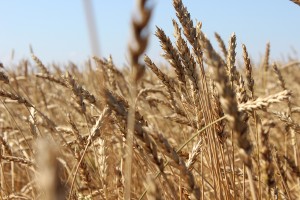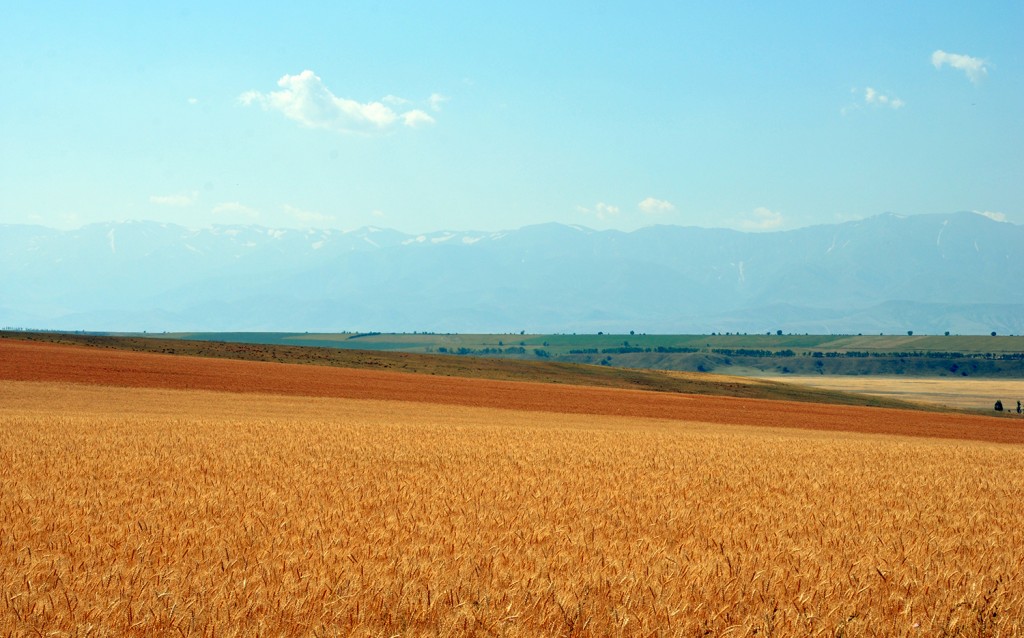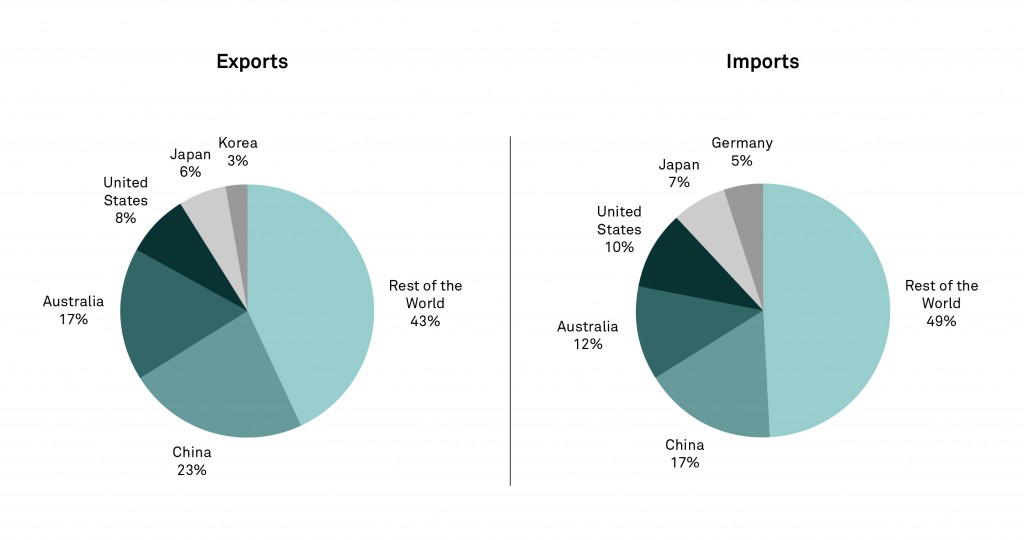The economies of Europe and Eurasia are facing significant challenges today, given the fallout from ongoing geopolitical tensions around the conflict-hit Ukraine, and as a result are undergoing significant macroeconomic and structural adjustment.
Falling crude oil prices are intertwined with a structural slowdown. Consequently, low oil prices will put significant pressure on the budget, limiting fiscal space for further investment and other stimulus. According to World Bank statistics, the annual GDP percentage growth rate at Kazakh market prices was 4.1 percent in 2014, whereas for 2015 and 2016 the forecast is a notably-lower increase of 1.8 percent and 3.2 percent, respectively. After a sharp deceleration in 2014, however, growth in the region is projected to recover moderately with an increase of 4.7 percent by 2017.
Moreover, capital inflows into a few countries of the region, namely Azerbaijan, Kazakhstan, Romania and Turkey, resulted from the successfully placed modest-sized bond issues in the market. In Kazakhstan, authorities are taking additional measures to support the financial sector. Some of them include increasing the capitalisation of the Bad Loans Fund, which the government created to tackle the financial crisis of 2007-2009, expanding eligible loans for purchase by the entity and changing the tax rules and insolvency regime to incentivise debt write-offs.
Notwithstanding the current crisis, Kazakh President Nursultan Nazarbayev, who steered the country through the previous recessions of 1998-1999 and 2008-2009, has adopted a new strategy for the country’s development. “A number of anti-crisis measures were taken last year. We enhanced partnership with international financial institutions last year and felt full support from them as we made deals for over $8 billion,” he said in announcing his anti-crisis programme Nurly Zhol – The Path to the Future during the annual state-of-the-nation address in November 2014.
Nazarbayev referred to the National Fund, a sovereign deposit accumulating excess revenues from the export of raw materials, as a major source of reserves that would help implement the government’s extensive anti-crisis plan of action. The President noted vthe government used it successfully to tackle the economic crisis of 2007-2009, when $10 billion sourced from the fund was funnelled into supporting the banking sector, construction industry and small- and medium-sized enterprises and boosting employment.
“As for the rest of the money, we have not spent it. We saved and multiplied it. Now we are in the period when we must use these reserves. They will help overcome uneasy times and stimulate the growth of our economy,” Nazarbayev argued. As of February 2015, the National Fund’s assets exceeded $78 billion.
Furthermore, in order to attract additional funding and increase the flow of investment into the country, the Kazakh Parliament adopted a law on June 30 regarding amnesty for Kazakh citizens, repatriates and persons holding a residence permit due to the legalisation of their property. The nation’s Minister of Finance Bakhyt Sultanov anticipates the inflow of money and property from the campaign to reach up to $12 billion. Naturally, the question arises how the government should manage this money in terms of preventing crises and taking into account a long-term perspective.
The President’s overall goal for his government is to develop Kazakhstan’s business environment so that it becomes one of the world`s top thirty largest economies. It is clear that in order to implement this serious objective, the government should work on it intensively. For instance, in 2011 the World Bank’s Doing Business report acknowledged Kazakhstan as the number onepro-business reformer government in the world. Still, it is too early to claim Kazakhstan is the best place for small and medium-sized enterprises and the manufacturing industry. There is a lot of work to do in this regard and the government does not seem to be lenient on pursuing the changes needed.
 It is widely believed that agriculture is one of the priority sectors of Kazakhstan’s future economy. The country is one of the top 15 producers of wheat in the world, with its harvests competing in quality with those of Canada. Despite the ongoing cuts in government spending, it was announced on Feb. 18 that the farming sector will receive an additional 20 billion tenge ($107.3 million) in government funding in 2015.
It is widely believed that agriculture is one of the priority sectors of Kazakhstan’s future economy. The country is one of the top 15 producers of wheat in the world, with its harvests competing in quality with those of Canada. Despite the ongoing cuts in government spending, it was announced on Feb. 18 that the farming sector will receive an additional 20 billion tenge ($107.3 million) in government funding in 2015.
Moreover, Kazakhstan must use all the benefits of its membership in the recently-launched Eurasian Economic Union. In light of current sanctions, Russia is a huge market with high demand for all types of products. When prices rise due to high demand, the seller will want to increase capacity to produce greater quantity. We should not neglect the fact that during the transition period when joining the World Trade Organisation (WTO), it will be crucial to intensify the investments in agriculture, the processing industry and service structures. To enhance agricultural productivity, the government needs to invest in expanding infrastructure such as roads, irrigation and communication systems. In addition, in order to prevent future risks after joining the WTO it is of paramount importance to support farming in various creative ways.
One of the feasible solutions might be encouraging and helping farmers to enhance their qualifications and skills in those countries where the agrarian sector is well developed and successful, like New Zealand, which is world famous for its productive farms. The best way to experience this unique way of life is to live it yourself on one of over 400 farms around the country.
According to the Kazakh Committee on Statistics, the country’s exports to New Zealand in 2014 totaled $11,900 and imports were$2.1 million. Kazakhstan imports meat, dairy products, fish and equipment from New Zealand.
New Zealand’s agriculture
New Zealand is heavily dependent on international trade, particularly in agricultural products. Its highly-competitive and efficient primary production systems are exported to every corner of the globe. Its major export partners are Australia, United States, China and Japan, as shown inthe pie chart below (data from2014). New Zealand and China signed the New Zealand–China Free Trade Agreement on April 7, 2008, the first such agreement China has signed with a developed country.
New Zealand’s stringent food standards have led to a high-performing primary sector. The country has implemented robust biosecurity measures and has high levels of food traceability. The World Organisation for Animal Health has recognised New Zealand as free of animal diseases. The country’s reputation for farming expertise and quality food-production systems places it in a strong position to meet the world’s increasing food demands. Furthermore, the country is one of the most efficient agricultural economies with a reputation for producing internationally-significant research, agricultural practices and products.
As a country with considerable potential, Kazakhstan should learn more from New Zealand’s experience on the way to establishing and managing productive farms. New Zealand’s Lincoln and Massey universities offer study areas such as agriculture, commerce, computing, engineering, environment, food, forestry, horticulture, hospitality, landscape, property, recreation, sciences, transport and winemaking. These universities provide an opportunity to gain experience from the best agribusinesses. Consequently, after finishing their education Kazakhstan’s farmers would acquire a confidence and willingness to implement new ideas and experiences which would help farming industry progress in the nation.
It is vital to support agriculture through implementing action which is needed at all levels to revitalise Kazakhstan`s agricultural sectors. Rural communities and small farmers deserve empowerment and assistance from the government through the provision of additional financing and access to technology and technical know-how.
The author is a graduate student of the Foundation of Diplomacy course at the University of Oxford.


